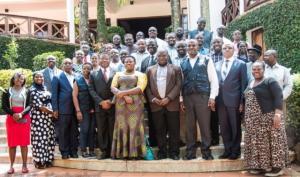WHO convenes orientation meeting for the Uganda National Malaria Control Program
Jinja, 24th August 2016 - The World Health Organization (WHO) Country Office in Uganda has organized a four-day retreat to orient the new and old National Malaria Control Program (NMCP) staff. Through funding from Department for International Development (DFID), Global Fund, Clinton Health Access Initiative (CHAI), Presidential Malaria Initiative (PMI) and other partners, the Ministry of Health (MoH) has recruited a number of staff and received more staff seconded by WHO and UNICEF.
The Malaria Programme Review (MPR) and Malaria Reduction Strategic Plan (MRSP 2014-20) identified programme strengthening as one of the key strategies to enable implementation of malaria control interventions. In this regard, with partnership from WHO and UNICEF, MoH identified orientation of programme staff as a key activity.
The Minister of State of Health in Charge of Primary Health Care Hon. Dr. Joyce Moriku Kaducu in her remarks to officially open the retreat thanked WHO for convening a retreat that brings all partners of MoH in combating malaria, together. She encouraged NMCP staff to exercise team work, have commitment and right attitude towards work, respect one another, self-esteem, and personal vision as well as make the working environment conducive for everybody. She further called on partners to support MoH to formulate integrated structures that focus on tackling malaria. Hon. Kaducu finally committed the ministry’s top leadership to reducing and gradually eliminating malaria out of Uganda saying “One day, with commitment, we will achieve our targets.”
The WHO Country Representative in Uganda, Dr. Wondimagegnehu Alemu advised malaria partners to step up coordination, work together and find solutions to the prevailing problems in order to achieve the global targets of malaria; to eliminate malaria by 2030. He further emphasized the need to make the implementation of the Malaria Reduction Strategic Plan more inclusive by involving the district leaders in planning and implementation, “Let the partners come together with the districts and be part of the planning process,” he said. He drew emphasis to the need for integration with other existing arrangements like integrated vector management and malaria surveillance to consider linkages with Integrated Disease Surveillance and Response (IDSR).
The retreat attracted participants from UNICEF, DFID, CHAI, PMI, Malaria Consortium, Programme for Accessible Health Communication and Education (PACE), Uganda Health Marketing Group (UHMG), Malaria and Childhood Illness Network Secretariat (MACIS), The AIDS Support Organization (TASO), PILGRIM Africa and WHO Country office and Inter Country Support Team (IST) staff.
NOTE
The WHO African Region continues to bear the brunt of the global burden of malaria. In 2015, 88% of global cases and 90% of global deaths occurred in the African Region. Between 2000 and 2015, the number of malaria cases declined by 42% while the malaria death rate declined by 66% in the African Region
WHO in Uganda has provided technical guidance to MoH to roll out malaria control interventions according to standard technical guidelines including the current Malaria Reduction Strategic Plan. In addition, WHO emphasizes use of partnerships coordination for strengthened malaria control efforts.
____________________________________________________________
For more information, please contact:
Mwebembezi Edmond, Tel: +256 414 335569, Cell: +256 782 962674, Email:mwebembezie [at] who.int (mwebembezie[at]who[dot]int)



